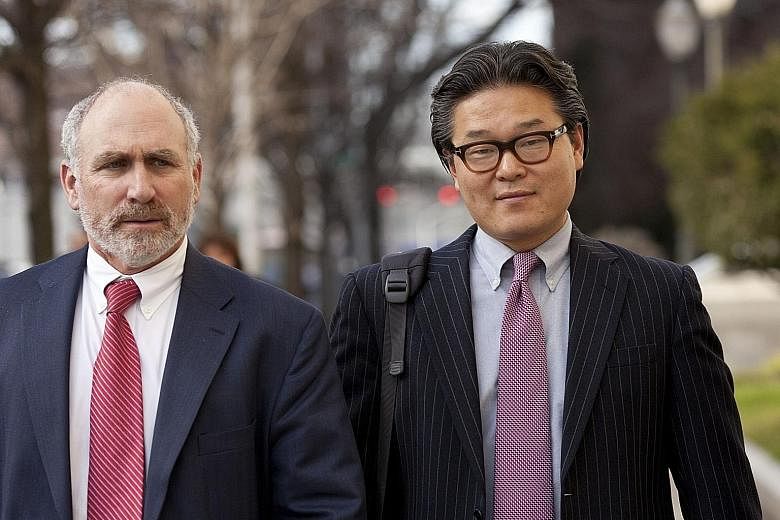NEW YORK • From his perch high above Midtown Manhattan, just across from Carnegie Hall, Bill Hwang was quietly building one of the world's greatest fortunes.
Even on Wall Street, few ever noticed him - until suddenly, everyone did.
Mr Hwang and his private investment firm, Archegos Capital Management, are now at the centre of one of the biggest margin calls of all time - a multibillion-dollar fiasco involving secretive market bets that were dangerously leveraged and unwound in a blink.
Mr Hwang's most recent ascent can be pieced together from stocks dumped by banks in recent days - ViacomCBS, Discovery, GSX Techedu, Baidu - all of which had soared this year, sometimes confounding traders who couldn't fathom why.
One part of Mr Hwang's portfolio, which has been traded in blocks since last Friday by Goldman Sachs Group, Morgan Stanley and Wells Fargo & Co, was worth almost US$40 billion (S$53.8 billion) last week. Bankers reckon that Archegos's net capital - essentially Mr Hwang's wealth - had reached north of US$10 billion. And as disposals keep emerging, estimates of his firm's total positions keep climbing: tens of billions, US$50 billion, even more than US$100 billion.
It evaporated in mere days.
"I've never seen anything like this - how quiet it was, how concentrated, and how fast it disappeared," said Mr Mike Novogratz, a career macro investor and former partner at Goldman Sachs who's been trading since 1994. "This has to be one of the single greatest losses of personal wealth in history."
Late on Monday in New York, Archegos broke days of silence on the episode.
"This is a challenging time for the family office of Archegos Capital Management, our partners and employees," Ms Karen Kessler, a spokesman for the firm, said in an e-mailed statement. "All plans are being discussed as Mr Hwang and the team determine the best path forward."
The cascade of trading losses has reverberated from New York to Zurich to Tokyo and beyond, and leaves myriad unanswered questions, including the big one: How could someone take such big risks, facilitated by so many banks, under the noses of regulators the world over?
REGULATION OF FAMILY OFFICES
One part of the answer is that Mr Hwang set up as a family office with limited oversight and then employed financial derivatives to amass big stakes in companies without ever having to disclose them.
Another part is that global banks embraced him as a lucrative customer, despite a record of insider trading and attempted market manipulation that drove him out of the hedge-fund business a decade ago.
A disciple of hedge-fund legend Julian Robertson, "Bill" Hwang Sung Kook shuttered Tiger Asia Management and Tiger Asia Partners after settling an SEC civil lawsuit in 2012 accusing them of insider trading and manipulating Chinese banks stocks. Mr Hwang and the firms paid US$44 million, and he agreed to be barred from the investment advisory industry.
He soon opened Archegos - Greek for "one who leads the way", structuring it as a family office.
Family offices that exclusively manage one fortune are generally exempt from registering as investment advisers with the US Securities and Exchange Commission . So they don't have to disclose their owners, executives or how much they manage - rules designed to protect outsiders who invest in a fund. "This does raise questions about the regulation of family offices once again," said Mr Tyler Gellasch, a former SEC aide who now runs the Healthy Markets trade group.
"The question is if it's just friends and family, why do we care? The answer is that they can have significant market impacts, and the SEC's regulatory regime even after Dodd-Frank doesn't clearly reflect that."
Archegos established trading partnerships with firms including Nomura Holdings, Morgan Stanley, Deutsche Bank and Credit Suisse Group. For a time after the SEC case, Goldman refused to do business with Mr Hwang on compliance grounds, but relented as rivals profited by meeting his needs.
The full picture of his holdings is still emerging, and it's not clear what positions derailed, or what hedges he had set up.
One reason is that Mr Hwang never filed a 13F report of his holdings, which every investment manager holding more than US$100 million in US equities must fill out at the end of each quarter. That's because he appears to have structured his trades using total return swaps, essentially putting the positions on the banks' balance sheets. Swaps also enable investors to add a lot of leverage to a portfolio.
Morgan Stanley and Goldman Sachs, for instance, are listed as the largest holders of GSX Techedu, a Chinese online tutoring company that's been repeatedly targeted by short sellers. Banks may own shares for a variety of reasons that include hedging swap exposures from trades with their customers.
Without the need to market his fund to external investors, Mr Hwang's strategies and performance remained secret from the outside world. Even as his fortune swelled, the 50-something kept a low profile. Despite once working for Mr Robertson's Tiger Management, he wasn't well-known on Wall Street or in New York social circles.
BLOOMBERG

